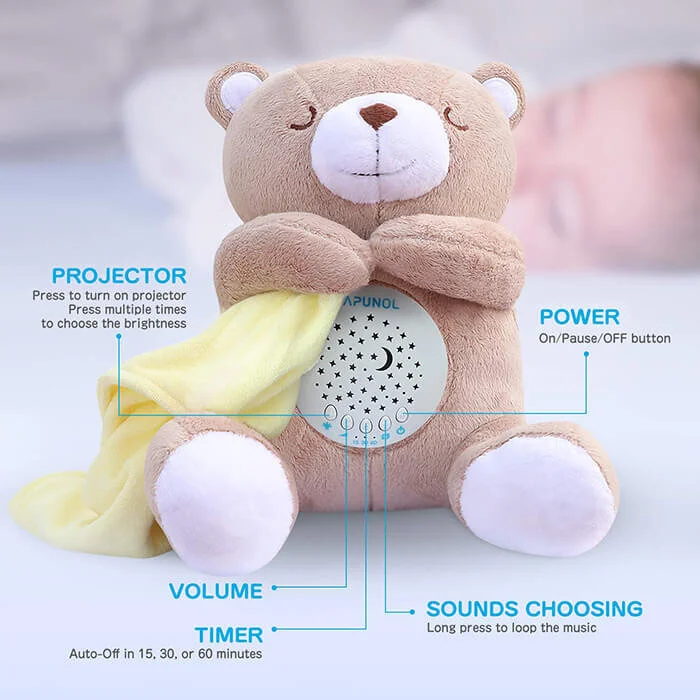Sleep Regression A Break In Your Child’s Sleep Schedule
Sleep regression. It is every new parent’s worse nightmare and something that impacts more babies than you may think. If you aren’t familiar with sleep regression, it happens when your baby who already has a sleep schedule in place starts waking up in the middle of the night, refusing to nap and completely messing up that great sleeping schedule you set up.
There are so many parents who find themselves in this situation. They are all excited about their baby’s perfect sleep schedule and then one day—everything has changed. It unfortunately happens to a lot of babies, and while you may not be able to prevent sleep regression from taking place, there are things that you can do to prepare for this phase, adapt to it and hopefully make it through the sleepless nights it brings.
What is a Sleep Regression?
Before you start panicking about the idea of your baby not sleeping again, it is important to remember that sleep regression is not permanent. Most babies will eventually grow out of this state with some time.
So, what exactly is sleep regression?
Swaddles are great for sleep regression
First, there is no real “preparing” for when sleep regression is going to happen. Every baby is different, and typically the change literally happens overnight. However, there are a few major milestones where most babies are more likely to suffer from sleep regression: 4 months, 9 months and 18 months.
Some babies only struggle with sleep regression during nap time, some struggle only during bedtime, and some babies struggle with both. No matter when your baby is more likely to struggle with sleep regression, it is common for babies to be quite cranky and fussy (they aren’t sleeping after all) and to either not want to fall asleep at all or to wake up several times when they do.
Issues with sleep regression typically coincide with those big baby milestones. So, when your baby is first learning to crawl, gets their first tooth or sits up… don’t be surprised if a bout of sleep regression happens to accompany it.
What Are the Signs Of Sleep Regression?
The first thing to remember is that there is a difference between full-on sleep regression and a few nights of bad sleep. Every baby will go through a phase where they have a night or two of poor sleep (just like adults do) so not every “bad night” ultimately means the beginning of a six-week sleep regression.
There are some signs to look for.
Baby will not fall asleep at their normal bedtime.
Your baby is more tired and fussy than normal, especially at night.
Baby is waking up multiple times in the middle of the night, after already establishing a set sleep routine.
Your baby is fussing in the middle of the night but doesn’t seem to be hungry or have a diaper to change.
Of course, you will also want to make sure that you rule out any injury or illnesses. As a parent, you have great intuition and will be able to tell if your baby is restless from sleep issues or if there is something else going on that may require a visit to the doctor.
At What Stages in Life Does Sleep Regression Happen?
While sleep regression stages can vary from baby to baby, here are some of the most common stages for babies to experience issues with sleep regression and what you as parents can expect.
Use Sound Machines to help address Sleep Regression
4 Month Sleep Regression
This is the most common age for sleep regression, and nearly all babies will have a setback in their sleep patterns at this age. While the term “four month sleep regression” is quite common—the actual time when babies experience this change can vary.
Sometimes it is as early 2 months and sometimes babies don’t go through this regression until they are five months old.
During this time, as babies are really adapting to life outside of the womb, their sleep cycles will naturally change, which is why no matter how hard you have tried to get them on that set sleep regimen, they may not be able to help their inability to fall asleep at stay asleep.
8 Month Sleep Regression
Sleep Regression can be addressed with some soothing sounds
This is another common time for babies to battle with sleep depression, and while it can happen around 8 months, some babies may not hit this sleep milestone until they are 10 months old.
This is a common time for babies to struggle with sleep regression, because they are hitting a major brain development milestone as they are learning to sit up, crawl and understand language.
All of this stimulated brain activity is known to make an impact on sleep patterns.
Keep your child comfortable to help with sleep regression
12 Month Sleep Regression
This is perhaps the least common milestone for sleep regression to happen—but it does occur and it typically occurs with naps. Babies who struggle with sleep regression around the one year mark usually do so because they are struggling with separation anxiety from their parents.
The good news is, most parents find a quick fix to this solution is to transition to one nap per day.
18 Month Sleep Regression
A quality sound machine can help with Sleep Regression
This is the last common age for babies to struggle with sleep regression and it happens right when they are transitioning to that fun toddler stage.
A lot of times, their sleep issues can have to do with separation anxiety from their parents, teething issues or simply because they are starting to think they are independent.
Luckily for parents, this stage typically only lasts a few weeks and then it is time for the “Terrible Twos.”
How Long Does Sleep Regression Last?
This is perhaps the most common question that parents have about sleep regression. Typically, sleep regression only lasts between 3 weeks and 6 weeks at a time and this is true for virtually every stage.
While this can seem like a long time, it is important to remember that it will pass. The thing to remember is that your baby will grow out of this stage, so the more you can do to stick with your sleep plan and to try to stay on schedule (even when it is difficult), the better off everyone will be. You don’t want to regress as well and start using old habits, like pacifiers or rocking that you have already broken, just to get your baby to sleep one night.
You don’t want these old habits sticking during the sleep regression stage.
Are You a Survivor?
Sound Soothers are Ideal for Sleep Regression
Surviving sleep regression is no laughing matter. It can be very difficult, for any parent to get through these stages in their baby’s life, especially when they thought their initial sleep troubles were over. However, these tips can help you survive sleep regression and make it through the struggles.
Do your best to stick to the plan. Consistency is key when it comes to getting through a stage of sleep regression. While you (and baby) will be off your usual schedule, the more diligent you can be to get back on that schedule, the better.
Keep a Calm Environment- The more you can use calming, soothing techniques in order to keep your baby relaxed, the better. While reading a book or a soothing bath can be time consuming, it is an effective and natural way to help your baby relax and naturally fall asleep.
Sleep When You Can- Your sleep schedule is going to change when your baby’s sleep schedule changes, but you don’t want this depriving you of the sleep that you need in order to function as a parent. You are going to have to alter your sleep schedule and work around your baby’s as you do your best to keep them on schedule,
Don’t Be Afraid to Throw in Some Extra Feedings- A great way to make it through this trying time is to give your baby a little extra fuel to help them get through their sleep regression. Typically, this means your baby is going through a growth spurt or other changes meaning they will be hungrier. This can help with that fussiness.
The best thing you can do to survive sleep regression is to make sure that you remember while it is tough on you—this phase is also tough on your baby, so do your best to stay patient and you will get through this trying time together!
Get A Better Understanding Of Sleep Regression and How To Comfort Your Child
Sleep regression is a serious issue for many parents as it means nothing but more sleepless nights. However, the good news is, sleep regression is normal in babies and while it can be frustrating, it is typically no cause for alarm.
The best thing you can try to do is to take it in stride, sleep when you can and keep our tips in mind for surviving sleep regression issues. Remember, sleep regression is not permanent, and like all difficult stages with little ones—it too will pass.
Shana Thompson is a full time professional writer and editor. Shana has worked extensively in the fields of content marketing, on-page and off-page SEO (guest posts, backlink acquisition), and creative writing. As an experienced pro content writer, Shana has worked on several magazines, publishing companies and marketing agencies. Many recent projects have included everything from nutrition and health services, where a lot of research and citations were needed, to writing about health, sustainable, eco-friendly products.
Follow Shana at Shana Thompson


















